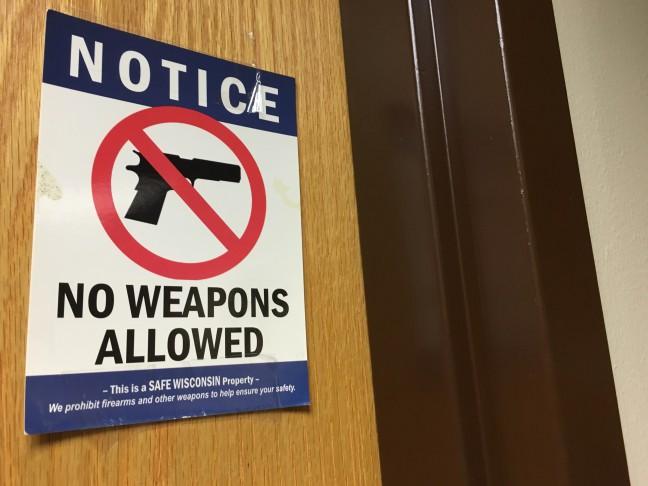Convicted felons in Wisconsin will be put behind bars for at least three years if they are caught carrying guns after Gov. Walker signed a bill into law Wednesday that sets the mandatory minimum sentence on such a crime.
The bill that raised heated debates on the Senate floor is expected to curb gun violence in the state by setting longer prison sentence terms. It establishes mandatory minimum sentences of three years for convicted felons who own firearms and adds five more years if the person commits another violent felony.
Ashley Moore, spokesperson for the bill’s co-author Rep. Joel Kleefisch, R-Oconomowoc, said Kleefisch views the bill as an important first step to address the problem of gun violence in Wisconsin and to restore people’s sense of security.
“I think it will give communities a chance to take a breath and [allow] them to rebuild — with strength and confidence and security — that they’re safe in their state [and] in their homes,” Moore said.
Sen. Lena Taylor, D-Milwaukee, suggested otherwise.
She wrote in a Milwaukee Courier column that the mandatory minimum is a way to show the state is “tough on crime,” when the real challenge is how to be smart on crime. Her proposed solution is data-driven policing, which looks at the percentage of crime rates of different races in different years and the cost that goes into longer prison sentences.
According to Taylor, taking judicial discretion out of the hands of judges is another flaw of the mandatory minimum. Instead of letting judges make fact-based sentences, she said in her column, the mandatory minimum will make them impose a sentence on people who might have committed less significant crimes undeserving of this sentence.
Walter Dickey, professor of law emeritus at University of Wisconsin, gave further explanation to this view. He said the bill gives judges enormous leverage in terms of the guilty plea. If someone wants to avoid the mandatory minimum, Dickey said, they can plead guilty to something they didn’t do that doesn’t involve the minimum.
“You can make them plea to a different offense that doesn’t include the mandatory minimum and we all go a happy way,” Dickey said. “This is really uncontrolled discretion exerted by prosecutors, and by and large I think to have it so unconstrained is not a good idea.”
But Moore said judges have not been using their decisions wisely, allowing offenders to get out of jail sooner than they should.
Those who advocate for the expansion of gun rights applaud that the legislation does not target any of the issues close to them, such as concealed carry.
Nik Clark, president of Wisconsin Carry Inc., said the bill specifically targets repeat offenders to make sure no safe gun users will be affected.
Chancellor Rebecca Blank: Concealed carry proposal ‘defies common sense’
Moore said overall, the law creates a standardized punishment for criminals in order to protect Wisconsin communities and families.
“Once [people] have a more secure sense about where they’re living and working and playing, I think the community will start working together and we’ll see a lot of improvements in our programs … our cities and other places in the state,” Moore said.














